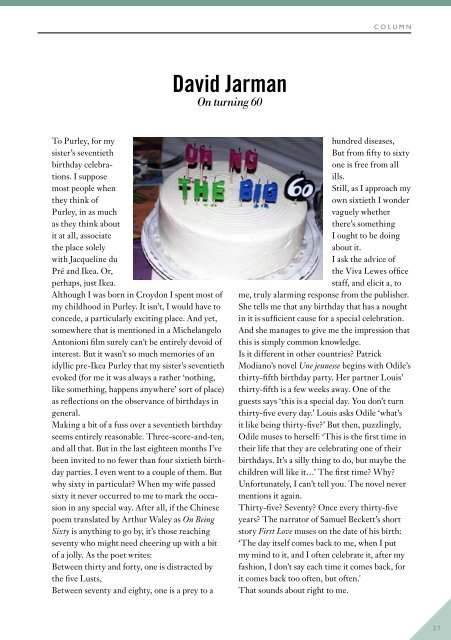Viva Lewes Issue #120 September 2016
Create successful ePaper yourself
Turn your PDF publications into a flip-book with our unique Google optimized e-Paper software.
COLUMN<br />
David Jarman<br />
On turning 60<br />
To Purley, for my<br />
sister’s seventieth<br />
birthday celebrations.<br />
I suppose<br />
most people when<br />
they think of<br />
Purley, in as much<br />
as they think about<br />
it at all, associate<br />
the place solely<br />
with Jacqueline du<br />
Pré and Ikea. Or,<br />
perhaps, just Ikea.<br />
Although I was born in Croydon I spent most of<br />
my childhood in Purley. It isn’t, I would have to<br />
concede, a particularly exciting place. And yet,<br />
somewhere that is mentioned in a Michelangelo<br />
Antonioni film surely can’t be entirely devoid of<br />
interest. But it wasn’t so much memories of an<br />
idyllic pre-Ikea Purley that my sister’s seventieth<br />
evoked (for me it was always a rather ‘nothing,<br />
like something, happens anywhere’ sort of place)<br />
as reflections on the observance of birthdays in<br />
general.<br />
Making a bit of a fuss over a seventieth birthday<br />
seems entirely reasonable. Three-score-and-ten,<br />
and all that. But in the last eighteen months I’ve<br />
been invited to no fewer than four sixtieth birthday<br />
parties. I even went to a couple of them. But<br />
why sixty in particular? When my wife passed<br />
sixty it never occurred to me to mark the occasion<br />
in any special way. After all, if the Chinese<br />
poem translated by Arthur Waley as On Being<br />
Sixty is anything to go by, it’s those reaching<br />
seventy who might need cheering up with a bit<br />
of a jolly. As the poet writes:<br />
Between thirty and forty, one is distracted by<br />
the five Lusts,<br />
Between seventy and eighty, one is a prey to a<br />
hundred diseases,<br />
But from fifty to sixty<br />
one is free from all<br />
ills.<br />
Still, as I approach my<br />
own sixtieth I wonder<br />
vaguely whether<br />
there’s something<br />
I ought to be doing<br />
about it.<br />
I ask the advice of<br />
the <strong>Viva</strong> <strong>Lewes</strong> office<br />
staff, and elicit a, to<br />
me, truly alarming response from the publisher.<br />
She tells me that any birthday that has a nought<br />
in it is sufficient cause for a special celebration.<br />
And she manages to give me the impression that<br />
this is simply common knowledge.<br />
Is it different in other countries? Patrick<br />
Modiano’s novel Une jeunesse begins with Odile’s<br />
thirty-fifth birthday party. Her partner Louis’<br />
thirty-fifth is a few weeks away. One of the<br />
guests says ‘this is a special day. You don’t turn<br />
thirty-five every day.’ Louis asks Odile ‘what’s<br />
it like being thirty-five?’ But then, puzzlingly,<br />
Odile muses to herself: ‘This is the first time in<br />
their life that they are celebrating one of their<br />
birthdays. It’s a silly thing to do, but maybe the<br />
children will like it…’ The first time? Why?<br />
Unfortunately, I can’t tell you. The novel never<br />
mentions it again.<br />
Thirty-five? Seventy? Once every thirty-five<br />
years? The narrator of Samuel Beckett’s short<br />
story First Love muses on the date of his birth:<br />
‘The day itself comes back to me, when I put<br />
my mind to it, and I often celebrate it, after my<br />
fashion, I don’t say each time it comes back, for<br />
it comes back too often, but often.'<br />
That sounds about right to me.<br />
27


















